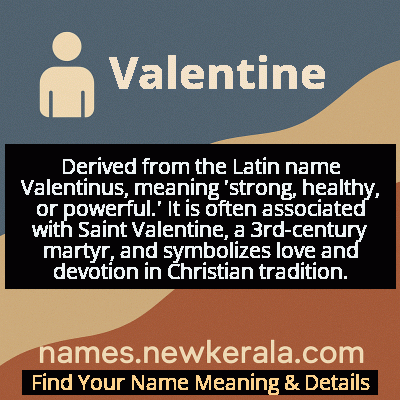Valentine Name Meaning & Details
Origin, Popularity, Numerology Analysis & Name Meaning of Valentine
Discover the origin, meaning, and cultural significance of the name VALENTINE. Delve into its historical roots and explore the lasting impact it has had on communities and traditions.
Name
Valentine
Gender
Male
Origin
Christian
Lucky Number
3
Meaning of the Name - Valentine
Derived from the Latin name Valentinus, meaning 'strong, healthy, or powerful.' It is often associated with Saint Valentine, a 3rd-century martyr, and symbolizes love and devotion in Christian tradition.
Valentine - Complete Numerology Analysis
Your Numerology Number
Based on Pythagorean Numerology System
Ruling Planet
Jupiter
Positive Nature
Optimistic, inspirational, and creative.
Negative Traits
Scattered, exaggerating.
Lucky Colours
Yellow, gold, purple.
Lucky Days
Thursday.
Lucky Stones
Yellow sapphire.
Harmony Numbers
1, 2, 9.
Best Suited Professions
Arts, writing, communication.
What People Like About You
Creativity, optimism.
Famous People Named Valentine
Saint Valentine
Christian martyr
Early Christian saint martyred in Rome, traditionally associated with courtly love and celebrated on Valentine's Day
Valentinian I
Roman Emperor
Roman Emperor from 364 to 375 who successfully defended the empire's frontiers and restored stability after Julian's death
Valentine Greatrakes
Faith healer
Irish faith healer known as 'The Stroker' who claimed to cure various illnesses through touch during the Restoration era
Valentine Baker
Military officer
British Army officer who founded what became the Royal Air Force and served in various colonial campaigns
Name Variations & International Equivalents
Click on blue names to explore their detailed meanings. Gray names with will be available soon.
Cultural & Historical Significance
The name's endurance across centuries reflects its dual heritage of imperial strength and saintly compassion, making it a bridge between classical antiquity and Christian tradition. During the Renaissance, Valentine experienced renewed popularity as classical names regained favor among European aristocracy. The Victorian era saw the name romanticized through literature and the commercialization of Valentine's Day, cementing its association with courtly love and romantic idealism. In contemporary times, the name continues to evoke both historical gravitas and emotional depth, appealing to parents seeking names with both classical roots and heartfelt meaning.
Extended Personality Analysis
Individuals named Valentine are often perceived as possessing a unique blend of strength and compassion, reflecting the name's dual heritage. They typically exhibit emotional intelligence and empathy, making them excellent listeners and trusted confidants. Their inherent strength manifests not as aggression but as resilience and determination when facing challenges. Valentines often display romantic idealism and a deep appreciation for beauty and art, coupled with practical problem-solving abilities. They tend to be diplomatic mediators in conflicts, using their natural charm and persuasive communication skills to bridge differences.
The name suggests someone who balances heartfelt emotion with rational thought, creating individuals who are both dreamers and doers. Their loyalty to loved ones is typically unwavering, and they often serve as pillars of support within their social circles while maintaining an independent spirit that values personal freedom and self-expression. Valentines are frequently drawn to creative pursuits or helping professions where they can make meaningful connections and positive impacts. They possess an innate sense of justice and fairness, often advocating for the underdog while maintaining the diplomatic grace to navigate complex social situations. This combination of traits makes Valentines particularly effective in leadership roles that require both strategic thinking and emotional intelligence.
Modern Usage & Popularity
In contemporary usage, Valentine remains a distinctive choice that balances classical heritage with romantic connotations. While not among the top 1000 names in the United States in recent years, it maintains steady usage as a sophisticated alternative to more common names. The name enjoys greater popularity in European countries like France, Germany, and Italy, where variations like Valentin and Valentino rank within the top 200 names. Modern parents often choose Valentine for its elegant sound, historical depth, and the positive associations with love and strength. The name has seen a slight resurgence among parents seeking vintage names with meaningful backgrounds, particularly those interested in names that work well internationally. Its usage extends beyond Valentine's Day associations, with many parents appreciating its connection to multiple saints and historical figures who embodied compassion and resilience. In professional contexts, the name conveys sophistication and international appeal, while its relative rarity ensures memorable distinctiveness.
Symbolic & Spiritual Meanings
Symbolically, Valentine represents the harmonious union of seemingly opposing qualities: strength and tenderness, power and compassion, tradition and romance. The name embodies the concept of 'fortitude with heart'—the idea that true strength includes emotional intelligence and caring for others. In metaphorical terms, Valentine signifies the bridge between earthly power and spiritual love, reflecting its historical bearers who ranged from Roman emperors to Christian martyrs. The name carries connotations of healing and restoration, inspired by Saint Valentine's legendary healing miracles. It also symbolizes enduring love that withstands challenges, mirroring the saint's steadfast faith despite persecution. In broader cultural symbolism, Valentine represents the triumph of love over adversity and the power of compassion to transform relationships and communities. The name suggests an individual who can navigate both the practical demands of life and the deeper emotional currents that give life meaning, embodying the ideal of integrated wholeness where strength serves love and love empowers strength.

